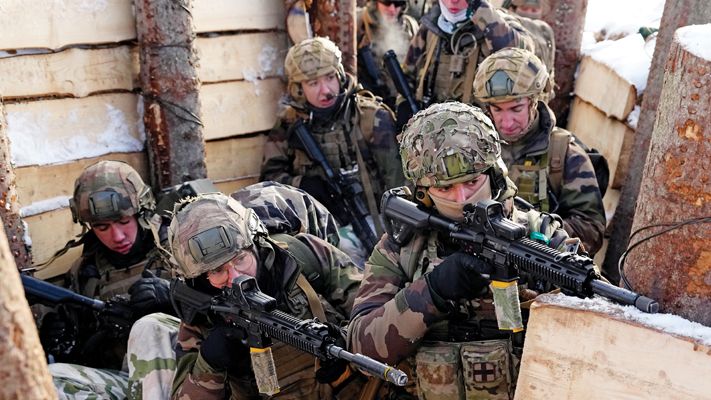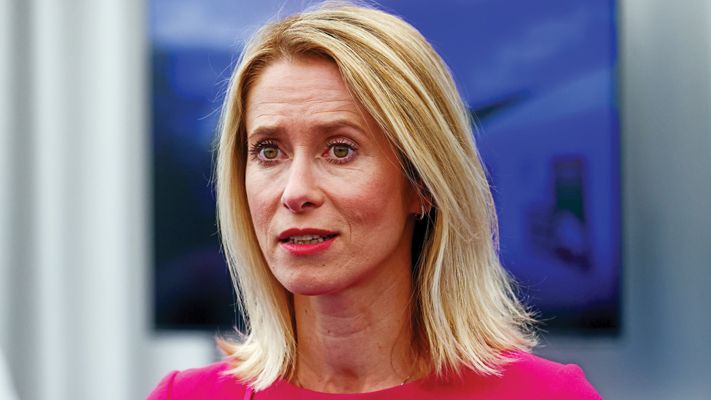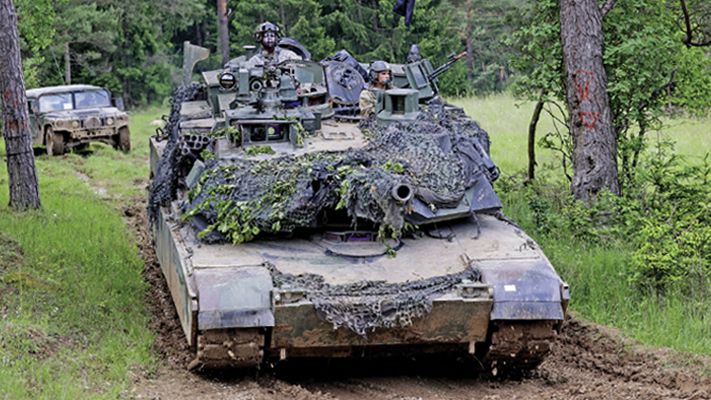
Next month, NATO’s most senior officials and prominent practitioners will convene in Washington, D.C. The timing is critical. The alliance has been around for 75 years, and the threats to it have gone through major changes. During the last three years, especially, Russia and China have been increasingly aggressive in their efforts to undermine U.S. influence globally. American embassies are closing across continents. U.S. and ally ships are cut off from certain international trade routes.
House Speaker Mike Johnson’s (R-LA) decision to bring the national security supplemental, which included billions more dollars for Ukrainian weapons and reinvesting in American weapons production to replenish its stocks as well as NATO allies’, to a vote in the House dredged up debates over fundamental questions. One of those questions is whether Russia would, if not stopped in Ukraine, attack one of the smaller members of NATO, such as Estonia. And the other more diplomatically sensitive question, but one that must be dealt with, is whether Estonia’s security is in the interest of Americans.

To the first question, Russia has never made a secret of its harmful designs for the Baltic region, nor hidden its willingness to use force to achieve those goals. Russian President Vladimir Putin has explicitly stated Russia’s view that the Baltic nations, as well as Poland, are Russia’s historic territory, and even if they remain nations in a technical sense, they have no right to choose to engage positively with the United States and its democratic allies.
Though the Russian invasion of Ukraine is the first phase of the country’s ambition to reclaim the pre-1989 Russian empire, Americans should not be fooled. Putin has been very clear: Under his watch, the “temporarily occupied Poland and our Baltic provinces” will be returned to full Russian dominion. When Putin makes threats, the democratic world should learn to believe him.
Consider that current Russian occupied territory in Ukraine is more than double the size of Estonia. Without American and NATO direct assistance, Estonia would fight valiantly but would not be able to resist Russian occupation.
Latvia and Estonia, in particular, share hundreds of miles of border with Russia, and even with new NATO members Finland and Sweden, Russia possesses a considerable regional time-distance advantage in the event of an attack. Russia has worked to deepen this advantage by increasing pressure on the Baltics, and therefore on NATO, through its military reform, defense industry buildup, and sustained incursions. Russia’s aims are obvious: gaining additional footholds of influence, gathering intelligence that might serve future operations, and destabilizing the Baltics as much as possible ahead of military action.

Moscow’s most recent efforts to leverage its influence against NATO’s eastern front have included increased cyberattacks, jamming airspace, expanded hybrid operations, and, most concerningly, a planned army corps near its northwestern border with Estonia that would double the number of Russian troops sitting on NATO’s doorstep.
Russia appears to be testing NATO’s stomach for confronting the Kremlin and so is becoming increasingly belligerent in its Baltic incursions. Fortunately, Estonia has set an excellent foundation for the U.S. to act. The Estonians articulated a strategy to enable Ukraine to win to protect themselves and in doing so strengthen the entire NATO alliance. And this brings us to the answer to the second question. Is Estonian security important to Americans? Yes, decidedly so.
Estonia, a geographically small nation though it is, is a vital contributor to U.S. security.
It has taken a clear-eyed view of the threats to the political-military interests of NATO.
First, the Baltics recognize that the flourishing “no-limits” friendship between China and Russia is one that only heightens the danger posed by Russia, and this has rightfully increased the Baltic wariness of Beijing. Under Prime Minister Kaja Kallas’s leadership, Estonia, along with Lithuania and Latvia, has worked to limit Chinese economic influence through its exit of “17 + 1,” a diplomatic forum established by Beijing to entice Central and Eastern European countries toward Chinese investments. This triple exit, along with Estonian efforts to forge stronger ties with Taiwan, constitutes a significant blow to China’s European charm offensive.
Estonia has also taken the initiative in upping internal security to repel Russian hybrid operations from its borders, which have included, among other things, destruction of property, high-profile vandalism, and bomb threats. Its concerted efforts to fight back against Russian influence, including collaboration with U.S. Cyber Command on critical cyber operations, have given Estonia the highest per capita rate of detained Russian agents in Europe and won it Moscow’s ire, including a Russian arrest warrant out for Kallas.

Finally, Estonia has followed its denunciation of the Russian threat with strong action to promote its own defense, including investment in the medium-range air defense system IRIS-T, HIMARS, cruise missiles, armored vehicles, large-caliber munitions, self-propelled howitzers K9, ammunition stocks, anti-ship capabilities, and sea mines.
Estonia has continuously provided unflinching support for Ukraine. It has advocated the strengthening of NATO manufacturing capabilities in order to combat the arms shortage in Ukraine, and Estonian-provided Javelin anti-tank missiles have also proven critical to Ukraine’s defense of Kyiv, along with the surface and land platforms, ammunition, and light weaponry included in Estonia’s expansive $87.5 billion aid package. In fact, the Baltics have all consistently been among the greatest NATO supporters of Ukraine in terms of highest relative GDP percentage put toward aid. Estonia has also partnered with Latvia to replenish Ukraine’s drone systems, as well as leading the Ukraine Defense Contact Group, a multinational coalition that focuses on upgrading military data systems and IT capabilities.
Estonia’s defense spending for 2024 sits at 3.2% of GDP, over a full percentage point above the NATO commitment, and it is set to rise as high as 5% in the coming years. In fact, all the Baltic countries fund defense at GDP percentages over the required 2%, and all are planning to raise it to at least 3% within the coming year. Estonia has focused on closing critical capability gaps through investment in air defense, anti-tank, and maritime defense infrastructure. This has not only strengthened Baltic internal security but has also supplemented NATO’s rapid response capability to a Russian attack on its eastern front.
CLICK HERE TO READ MORE FROM THE WASHINGTON EXAMINER
Estonia has embraced the principles that characterize the U.S.-led international order. And it continues to innovate to contribute to the security of the entire alliance. But it can only do so much given its physical size and geographic location. Estonia and the other two Baltic nations can only continue to oppose the Russian mobilization in and around their borders if the U.S., as the superpower with a coalescing impact on the alliance, provides diplomatic backing and defensive aid to deter Russia from launching further attacks — nuclear, conventional, or otherwise.
America must retake the lead in supporting the regional partners that have already taken the initiative in promoting our strategic interests. To do otherwise is to show Russia that unprovoked military aggression pays off and to show our most faithful allies that they stand alone against a major power hell-bent on their subsumption.
Rebeccah L. Heinrichs is a senior fellow at Hudson Institute and the director of its Keystone Defense Initiative.





